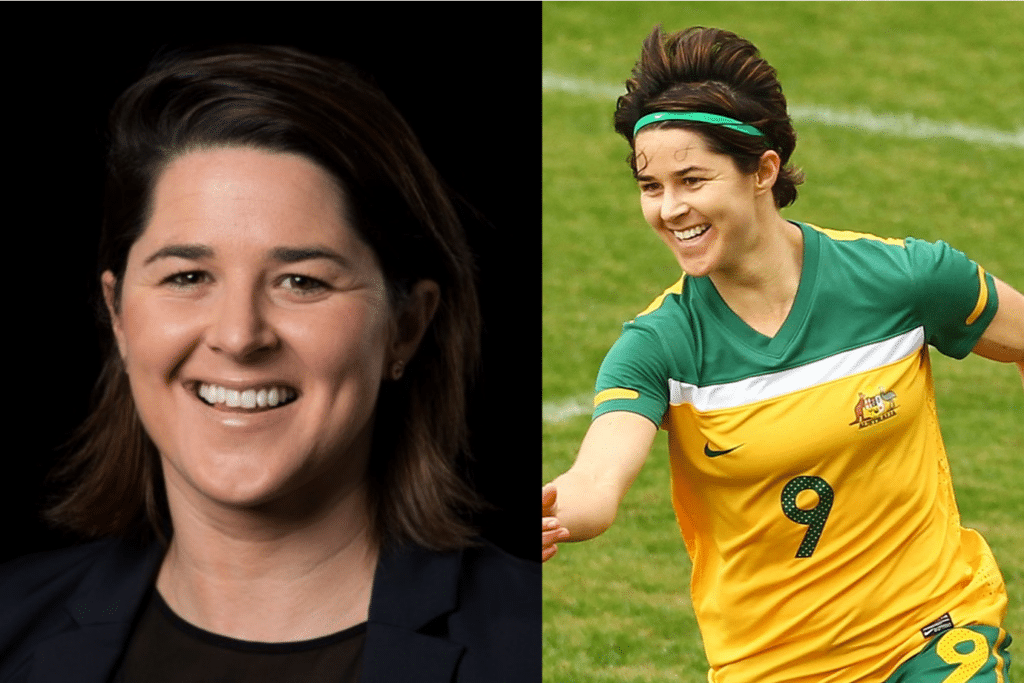Former Matilda star Sarah Walsh is no stranger to what it takes to be a female athlete in a notoriously male-dominated sport. With years of experience in football, Walsh is now affecting powerful change as Head of Women’s Football, Women’s World Cup Legacy and Inclusion at Football Australia.
She is reforming women’s football to ensure the future culture of the sport is an inclusive arena for all women.
As the Matildas make huge strides at the Women’s World Cup, Women’s Agenda chats with Walsh, on episode one of a new podcast series, in partnership with Stella Insurance, called It Takes Boobs.

Through the series, we challenge the typical sexist trope of it ‘taking balls’ to get big things done– definitely not the case. To kick off the podcast, we hear from Walsh about her multifaceted career and get her insights into the bright future of inclusion in women’s football.
“Playing at 5– being the only girl in a football club– not just in my team, you know moving into all-boys rep teams, and then finally making my way to the Matildas for over 10 years– I’ve always wanted things to be better,” says Walsh.
“And I find myself in this role now where I’m able to affect change in the heart of the national body.”
Proving that ‘it takes boobs’ to create big impact, Walsh has been spearheading initiatives at Football Australia to promote gender equality and inclusion within the sport.
“A lot of what I do is working across functions to make sure that we’re designing and creating programs and policy education that’s fit for purpose today for women– for all types of women– as intersectionality is crucial,” says Walsh.
One example of this is the Matildas’ parental policy, which Walsh says was developed to be fit for purpose for an athlete; meaning it supports them financially and considers their performance environment. The family friendly policy also accounts for parents who didn’t carry their child.
“Ironically, through this policy our high performance environment has been enhanced,” she says.
When it comes to policy reform and effective decision-making, Walsh says the key is to have the right people in the room.
“We absolutely need to listen to the lived experience when we’re either designing policy programs or education for the football community,” she says.
With the Women’s World Cup currently underway, Walsh says this tournament is a huge opportunity for Football Australia to “really shake things up” as well.
“We are the most multicultural sport,” she says. “We’re played in around 211 countries in the world, so we are uniquely, organically, multicultural and we need to make sure that our competition structures and the way in which we run our clubs mirrors that.”
Walsh sees Football Australia’s unique capacity to be a global leader on gender equality, with its ability to influence large and critical numbers of people.
One strong example of this was seen earlier this year, when FIFA was considering partnering with Saudi Arabia around the Women’s World Cup, despite the country’s appalling record on women’s rights and its recent crackdown on women’s rights defenders.
Walsh says Football Australia didn’t believe a partnership like that aligned with the values of both host countries– Australia and New Zealand– so they made their position clear.
“We thought that a partnership with Saudi really just was in stark conflict with what we wanted to achieve as hosts,” says Walsh, noting also that Football Australia’s aim is to achieve fifty-fifty in gender participation.
“And so FIFA did listen and that didn’t go ahead which is really important,” she says.
Looking towards the future of women’s football, Walsh says Football Australia is focused on building better infrastructure in community facilities, making sure that our Matildas and young Matildas are set for the world stage, to be worldbeaters, not just at this tournament but beyond this tournament.”
“You can’t find a ticket for the Commbank Matildas group matches,” says Walsh. “They sold out in minutes. That doesn’t happen by chance, and it doesn’t just happen by hosting a World Cup.”
As for how to continue this rousing momentum, Walsh says Football Australia has a great framework to “continue partnerships with commercial and state and federal governments to make sure that we are building up to 2032 Matildas that compete in the Olympics.”
“It’s a fantastic time for the sport,” she says.


